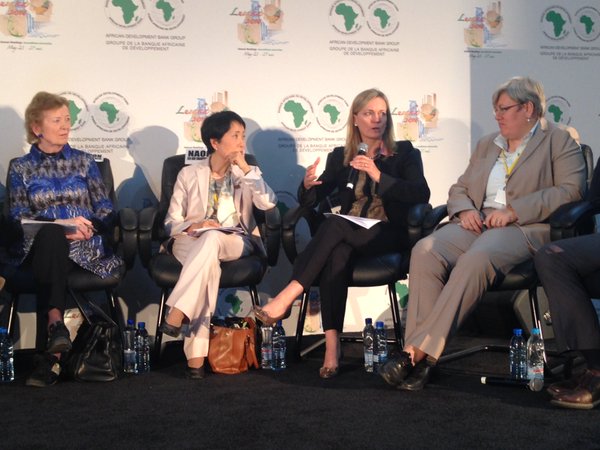How can Africa boost growth sustainably in its 54 economies to the benefit of all, when climate change causes high impacts on development and when clean development clearly comes with higher costs?
This was the issue debated at a special side event, Climate Change: Beating the Odds convened on Africa Day during the 51st Annual Meetings of the Board of Governors of the African Development Bank (AfDB) on 25 May.
Mary Robinson was a panelist at the debate which was convened by the African Development Bank, as part of its new development priorities for Africa. The debate discussed what a climate-resilient and low carbon development pathway for Africa should look like.
Opening the session, explained how climate change poses great challenges to Africa’s development, but it also presents a unique opportunity for a climate-resilient and low-carbon development within the continent.
Although 53 out of the 54 African countries have recently submitted their Intended Nationally Determined Contributions (INDCs) as part of the Paris Agreement, there is still a need to develop an ambitious and detailed enough plan to meet the goals of the landmark Paris agreement adopted in December 2015.
The challenge is made all the more acute for Africa, the most vulnerable continent to the effects of climate change, but which produces less than 4% of greenhouse gas emissions and which receives only 4% of global climate finance.
Despite many challenges, the opportunities for Africa are greater than anywhere else on the globe: the energy poor represent a market worth some $10 billion a year, while agriculture, on which nearly three-quarters of Africans rely, could almost treble in a generation to $880 billion.
Caroline Kende-Robb, Executive Director of the African Progress Panel explained how the narrative around green growth in Africa had shifted to be one of opportunity and outlined how momentum is building across the continent and the world to support African countries reach the global goal of universal access to electricity by 2030 — an effort that will require US$55 billion a year.
Mary Robinson highlighted the opportunities inherent in taking a climate justice approach to sustainable development saying “If to be successful, sustainable development and action on climate change must prioritise the needs of the poorest people. Eradicating energy poverty through the provision of sustainable energy services will be at the foundation of progress on all the other priority areas, therefore targeted approaches are required to ensure that the resources and expertise of the AfDB reach the “furthest behind first”.
The panelists included: Carlos Lopes, Executive Secretary, United Nations Economic Commission for Africa (UNECA), Mohamed Beavogui, Director General, African Risk Capacity (ARC), Naoko Ishii, CEO & Chairperson, Global Environment Facility (GEF), Marco Lambertini, Director General, World Wildlife Fund International (WWF), Rachel Kyte, CEO Sustainable Energy for All (SE4All) and Caroline Kende-Robb, Executive Director Africa Progress Panel.
Related Links
Zero Carbon Zero Poverty the Climate Justice Way
Meeting the Needs of the Poorest – A Role for Social Protection


